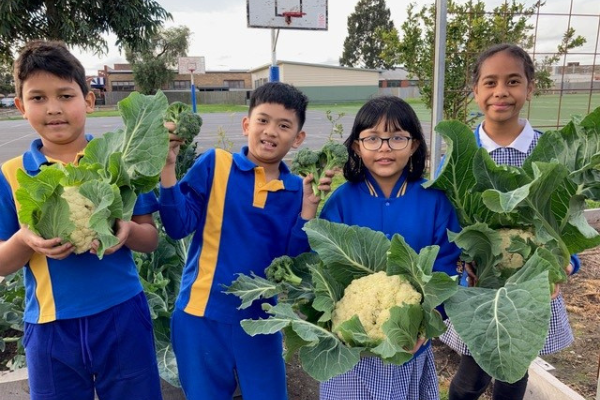Celebrating diversity through food

The Kitchen Garden Program has always been about so much more than teaching children how to grow and cook. It fosters social cohesion, celebrates diversity, and gives kids a sense of belonging and connectedness through food. At Springvale Rise Primary School in Victoria, the program has become a community hub, providing a place for students and parents to come together and celebrate each other’s cultures.
“We see the kitchen garden space as a way to embrace our community – addressing inclusion, and really trying to create a safe place for families who are newly arrived to Australia,” explains Principal, Debbie Cottier. It’s become a bit of a ‘one-stop shop’, offering everything from English language classes, yoga sessions, computer training, and playgroup. The aim is to support members of the school community from birth right through to the elder years, with a particular focus on building the capacity of women. “You build the capacity of women and mothers,” says Debbie, “and you build the capacity of families.”
The school has made a point of growing a diverse range of fruit and vegetables, and the Kitchen Garden Specialist, Mary Giannakopoulos, “explained to the children that our recipes each week would be based around touching base with each and every one of their cultures that were represented at school.” In one class, Mary found there were 22 students representing 21 cultures. “So you could choose from any part of the globe each week and you’d have a different recipe.”
An upshot of exploring students’ cultural backgrounds through food, suggests Mary, is that it fosters a deeper sense of belonging. “I’ve noticed in garden and kitchen classes when we touch on something the kids cook or grow at home their eyes light up and they’ll say ‘Oh I do that’. It’s almost adding a sense of validity that what they do at home is accepted and it’s good, amongst themselves and their peers.”

In addition to building community, the kitchen garden program also provides a space to monitor student wellbeing. “The garden is a bit of a refuge,” explains Mary. “Children who might not be having a great day can come and sit in the garden, have a chat, potter around… It helps them turn the switch and changes their view for the day.”
A quiet, leafy place to sit, or a chance to nurture a patch of earth might not seem like a huge thing. But for students coming back from remote learning or struggling to cope with issues at home or school, Debbie explains that having a space to practice being present can make a huge difference: “When the kids are out gardening alongside teachers, or alongside each other, kids will talk to you about stuff. If you’re sitting there pulling up weeds, you’re very likely to hear a story. And we need to know how students are really travelling after remote learning.”
In fact, the garden has been built into “a deliberate set of teachings around self-help strategies” at Springvale Rise Primary. “It’s part of our social and emotional literacy program,” explains Debbie, “Which explicitly teaches strategies to students to regulate, and to move from being from angry, in the red zone, down to being to calm, in the blue or the green zone. We have language children can choose or articulate that the garden is potentially the thing that helps them.”
Students also learn to practice self-confidence in the kitchen. “The kids love learning all the kitchen skills,” says Mary. “The fact that they’re trusted with proper knives, and proper equipment gives them a sense of achievement. The adults do a double take when they see the big knives come out, but the students are amazing. If you give them the responsibility that you expect at a certain level, they surprise every adult that sees them.”

As the school looks to re-engage students heading back into the classroom after a long stint in remote learning, they also hope to return their focus to other projects delayed by COVID. “My vision is that we can get the families in more, and do what we’ve always intended, which was to commit to cooking and recording culturally diverse recipes for prosperity. Some of which are just passed down orally,” says Debbie. As a proud Indigenous woman, Debbie also has plans to set up a native edible garden at the school, “Where we grow en masse some of our Indigenous plants and eat them.”
But to start with, the focus is on whipping the garden back into shape. “Now that we’re back we’re holding a joint reading and garden club, where we read outside in the garden whilst the students potter away and pull out weeds. The children are loving being back in the garden,” says Mary.
Support more students to connect through food with a donation to expand the Kitchen Garden Program.
< Back to Latest News
